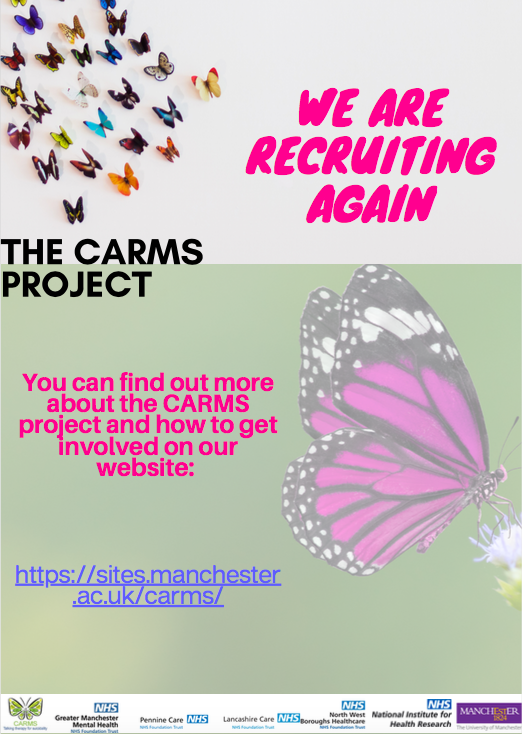
Originally published by Greater Manchester Mental Health NHS Foundation Trust (https://www.gmmh.nhs.uk/news/world-suicide-prevention-day-and-the-carms-project-4160)
On World Suicide Prevention Day, Charlotte Huggett, Trial Manager, tells us about how you can learn more about, and raise awareness of, suicide; and about the vital work of the Patient Safety Research Unit (PSRU) and the Cognitive AppRoaches to coMbatting Suicidality (CARMS) project.
Today, on the 10th September, across the globe, many organisations and individuals are getting involved to raise awareness of suicide, suicide prevention strategies and research, and remember those who have sadly lost their lives to suicide.
The International Association for Suicide Prevention (IASP) have a wide range of activities, information and materials that people can use to:
- learn basic strategies in talking to people about their suicidal experiences (take a minute);
- learn about the facts and figures which demonstrate how suicide is a global public health problem;
- gain ideas about what sort of activities to host to raise awareness of suicide and suicide prevention.
IASP are also leading the ‘Light a Candle’ campaign, asking people to light a candle near a window at 8pm so that people can “show their support for suicide prevention, to remember a lost loved one, and for survivors of suicide”.
We recognise that suicide prevention and awareness raising efforts should not just be limited to one day, but a continuous effort throughout the year. The academics, clinicians and experts by experience involved in the Patient Safety Research Unit (PSRU) have devoted over a decade to understanding why people may feel suicidal, have suicidal thoughts, urges, plans and make attempts to end their life. This has led to developing a suicide-focussed psychological talking therapy called Cognitive Behavioural Suicide Prevention (CBSP) therapy, which involves:
- Building rapport and a therapeutic relationship with people to create a safe environment for discussions about suicidal experiences to take place.
- Exploring and addressing beliefs that individuals hold in relation to themselves and the world, which may feed into suicidal thoughts and acts. People may feel defeated and unable to change their situation.
- Specific cognitive-behavioural techniques may involve ‘attentional control’, restructuring unhelpful beliefs and encouraging positive self-worth, ‘activity monitoring and scheduling’, and support to feel connected with those who could provide help and support.
(Note that this body of research actually pre-dates the PSRU).
Several pilot randomised controlled trials have found evidence to suggest that CBSP is feasible to deliver (meaning we are able to carry it out practically) and acceptable to those with suicidal experiences (meaning it is appropriate for this audience) in the context of people with psychosis in the community, male prisoners and on the inpatient wards. We’ve recently written a blog about suicidal experiences on the mental health inpatient wards, which you can read here.

The Cognitive AppRoaches to coMbatting Suicidality (CARMS) project officially started back in January 2017, where the CARMS team began gaining the relevant approvals to conduct the research. The NHS sites –Greater Manchester NHS Foundation Trust (GMMH), Lancashire and South Cumbria NHS Foundation Trust (LSCFT), Pennine Care NHS Foundation Trust and North West Boroughs Healthcare NHS Foundation Trust (NWBH) – were then set up ready to host the next step in investigating CBSP therapy, which was to see how effective it would be for people with non-affective psychosis and suicidal experiences in the context of the NHS and to examine the underlying mechanisms which lead to suicidal thoughts and acts.
We started recruiting participants back in May 2017 and we’re still going, even after a short break this year due to the COVID-19 pandemic. So far, we’ve recruited 252 people with non-affective psychosis and suicidal experiences, around half of whom have been randomly allocated to be offered CBSP. We’ve also met with 190 participants six months after they entered the project and 134 participants 12 months after they entered the project. This was to ask some questions about their mental health and to fill in some questionnaires.
We now have just under three months left of recruitment – until 30th November 2020 – with only 43 spaces left across GMMH and Pennine Care! You can find out how to refer/get involved on the CARMS website: https://sites.manchester.ac.uk/carms/
If you’re interested in finding out more about the project aims and design, the CARMS Trial protocol is free to access here: https://bmcpsychiatry.biomedcentral.com/track/pdf/10.1186/s12888-020-02697-8

* This article contains references to suicide that some people may find distressing so if at any point you require urgent support with your mental health please contact your GP, care coordinator or crisis team. Other help can be found here:
- Samaritans: Phone 116 123; Email jo@samaritans.org; Text 07725 90 90 90; Or visit your local branch
- Anxiety UK
- Self-Help Services: Online crisis support www.selfhelpservices.org.uk/the-sanctuary; Phone 0300 003 7029
- Rethink (Mon-Fri 9.30AM-4PM): Phone 0300 5000 927
- Saneline (4.30PM-10.30PM): Phone 0300 304 7000
- Mind (9AM-6PM): Phone 0161 236 8000 (local rates and mobile charges apply); Email info@mind.org.uk; Text 86463
- The University of Manchester Counselling Service
- The CALM Zone
- PAPYRUS
A bit about Charlotte Huggett
“I am currently the Trial Manager for the CARMS project and co-editor of the CARMS blog. I have previously worked as a Project Coordinator for the INSITE pilot trial and as a Research Assistant on a project which explored people’s experiences of mental health stigma. I have also previously worked for Stockport Mind, working 1:1 with people with mental health problems to support them in setting and achieving personal goals.
I am due to start as a Trainee Clinical Psychologist at The University of Manchester / Greater Manchester Mental Health NHS Foundation Trust towards the end of September 2020.”

